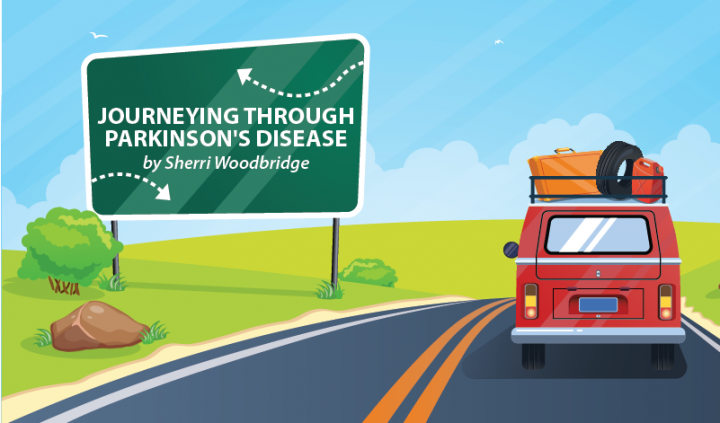Are You Wearing Spandex or a Potato Sack?

“You don’t look like you have Parkinson’s disease.” It’s a common refrain heard by those in our community. Everyone’s perception of this disease is different. And everyone wears Parkinson’s differently.
Recently, a graphic circulated among the Parkinson’s disease (PD) community showing the visible and invisible symptoms associated with the disease. Those who don’t look like they have Parkinson’s likely struggle more with invisible symptoms.
Outward symptoms of Parkinson’s disease
Visible signs of PD include rigidity of the muscles, dystonia, and tremors. These can be seen in the extremities, as well as the jaw, lips, and other parts of the body. Akinesia, bradykinesia, balancing issues, and even handwriting fit this category.
Visible signs stick out like a sore thumb. It’s like wearing a tight, ill-fitting, neon orange, one-piece spandex exercise outfit. Every curve is accentuated in an unattractive way.
Every bulge sticks out, drawing stares and whispers.
Internal symptoms of Parkinson’s disease
Hidden symptoms make diagnosing PD more difficult; minimal visible symptoms can mimic other diseases.
It’s like wearing a potato sack: You can’t tell what is underneath. But invisible symptoms are often greater in number than those that can be seen.
Insomnia and others sleep issues are common. Depression, panic attacks, apathy, hallucinations, dementia, and anxiety are often taboo subjects that need to be addressed. Patients struggle with swallowing difficulties, aspirating, speech problems, and gastric reflux. They don’t talk about the bladder and erectile dysfunction — or the constipation.
What’s wrong with your face?
A lack of facial expression (known as masking, or stone face, among the PD community) may come into play. And a loss of smell may come as a surprise, but it can have its benefits.
Pain should never be ignored as a potential symptom of Parkinson’s disease. While it may not be associated with your individual PD outfit, it is part of the potato-sack cover-up.
Whether an outfit is made of spandex or a potato sack, the symptoms are real. They can be devastating and overwhelming.
We need to remember that no matter what our symptoms look like, we are not alone. We are on this journey together.
***
Note: Parkinson’s News Today is strictly a news and information website about the disease. It does not provide medical advice, diagnosis, or treatment. This content is not intended to be a substitute for professional medical advice, diagnosis, or treatment. Always seek the advice of your physician or another qualified health provider with any questions you may have regarding a medical condition. Never disregard professional medical advice or delay in seeking it because of something you have read on this website. The opinions expressed in this column are not those of Parkinson’s News Today or its parent company, BioNews Services, and are intended to spark discussion about issues pertaining to Parkinson’s disease.







Comments
Paula Prange
Everytime I read one of your messages I thank God there are people like you who can express my feelings which are just like yours. I was diagnosed 11 years ago at the ripe age of 54. Since then my husband died at the age of 57 and I am left alone to make these choices. Somedays are easier than others. Thank you for your column-it always makes me smile.
Sherri Woodbridge
Thank you so much for your encouraging comment, Paula - it truly made my day!
Pamela Howard
Sherri,
As a newly diagnosed (10/10/2019) PWP at 65 years young, I hear those messages almost daily;"you don't look like you have Parkinson's".
Though I have difficulty walking,and other motor symptoms, I do not have tremors which so many associate with PD. Nor do they see the myriad of non-motor symptoms that I do not care to discuss with them. It does not feel supportive.
Your words validate my experience and I know I am not alone. Thank you.
Sherri Woodbridge
Pamela - i am glad you feel validated and that you know you aren’t alone because... you aren’t alone! We are in this together!